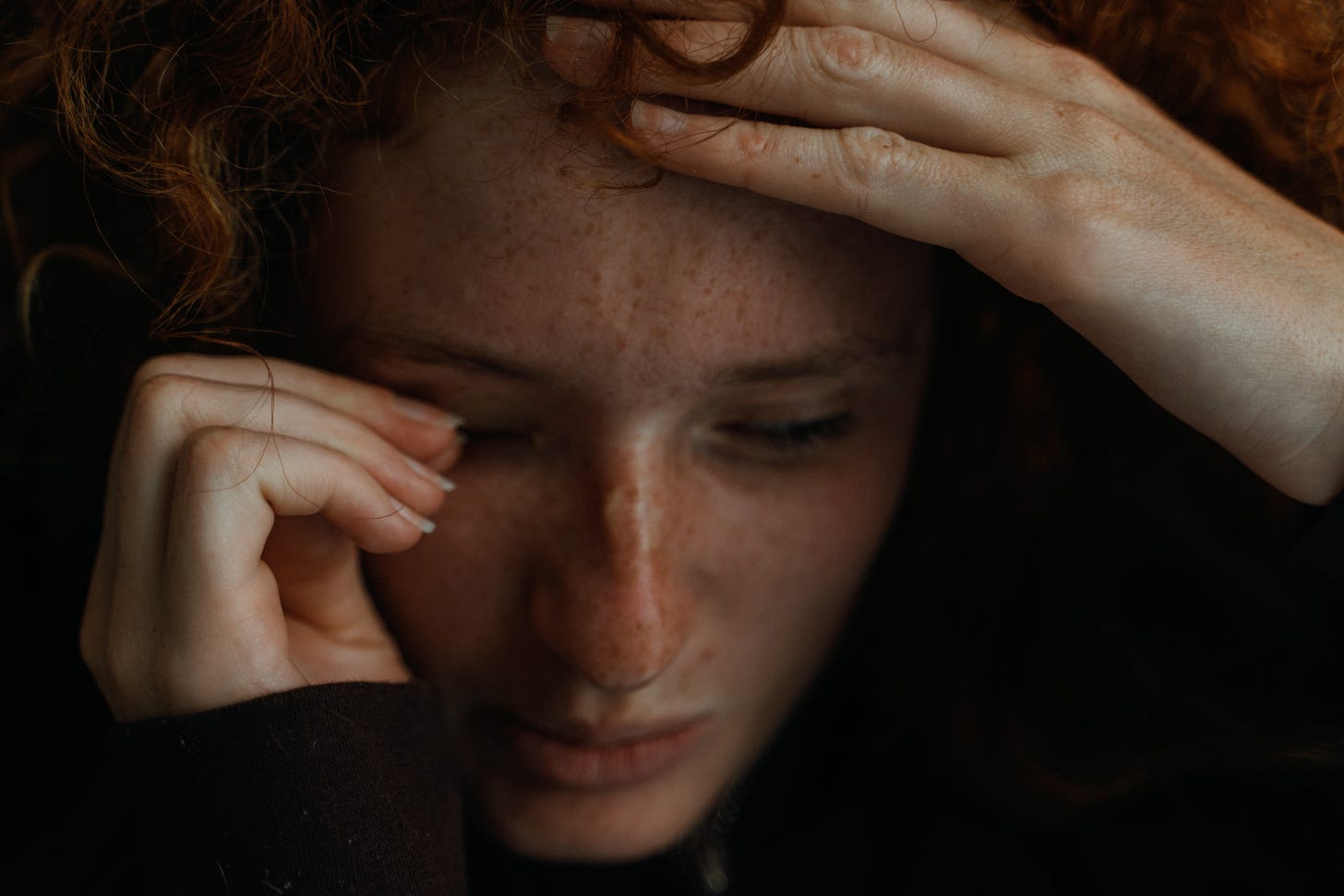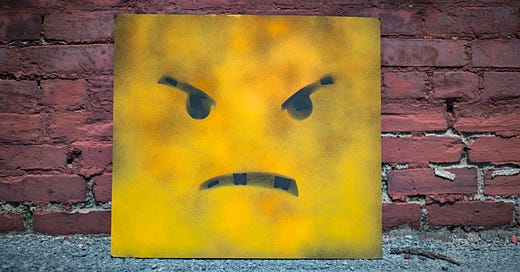

Discover more from Liberating Motherhood
The cycle of emotional abuse
Why emotional abuse is so effective as a tool of control--and is often even more damaging than physical abuse
In my last survey on women’s postpartum experiences, 52% of women reported experiencing some form of abuse in the fragile postpartum period. In an earlier survey, about half of women reported experiencing various forms of emotional abuse and psychological terror in their marriages.
Emotional abuse is the norm in heterosexual marriages. Yet many women don’t recognize the abuse for what it is, thanks to society’s ongoing gaslighting and loved one’s insistence that this is just the way men are.
Research shows that emotional abuse may actually be more harmful than physical violence, including to the children who witness it. And this form of abuse is highly effective at enforcing male dominance. Women in emotionally abusive relationships are more likely to stay, more likely to comply, and less likely to leave or to recognize the abuse for what it is. Maybe that’s why so many men deploy it to control their partners.
Understanding the cycle of emotional abuse can help you understand why it’s so effective—and perhaps even see your marriage for the emotionally abusive prison it actually is.
The basic cycle of abuse
Abuse almost always follows a predictable cycle:
Tension begins building. You can feel that your partner is angry, and things in the relationship are getting worse.
Your partner abuses you. This, for him, releases the tension. He feels calmer and, of course, doesn’t care how you feel.
Reconciliation. Your partner tries to win you back. He’ll often apologize, but try to find some way to justify the abuse. He snapped. You broke him. Whatever.
Calm. Things will be calm for a while. There may be a honeymoon period during which he is especially kind, causing you to believe that maybe he’s not actually abusive at all. Maybe it really is your fault.
Why victims of emotional abuse so often think it’s their fault
Emotional abuse follows the same cycle, but with one important distinction:
Society does not recognize emotional abuse as abuse. So the victim might not either. And even if she does, the people in her life will try to convince her that it’s really not that bad.
As a result, the abuse cycle with emotional abuse displays different characteristics. During the reconciliation period, it may actually be the abuse victim who begs for forgiveness. Here’s why.
After an act of abuse, he may not apologize. Instead, he may frame it as the inevitable result of all the terrible things she’s done to him. Because he has torn her down, she will begin to question herself. Maybe she actually deserves it. Maybe she’s the abusive one. Because she loves him, she will begin to panic that he might leave. And then she will be the one to apologize.
With each cycle, his emotional abuse will get worse. This tears down her sense of self, and causes her to question her own reality. Maybe what he’s doing is normal. Or maybe she’s just so unbelievably awful that she deserves it. Over time, she’ll accept more and more abuse. And with each cycle, she’ll do more and more to apologize to him for her own abuse, to win him back after each act of emotional violence. She’s constantly trying to prove her value to him, empowering him to abuse her even more, and distracting her to see his abuse for what it is.
This is exactly what he wants.
Because the guiltier she feels, the more she will do for him. More household labor. More parenting. More fawning. More sex. Less questioning. This arrangement can work for men for decades, allowing them to control their spouse, destroy her sense of self, and extract whatever they want from the relationship without ever laying a hand on her.
It’s incredibly effective, and this is why the most intelligent men may never become physically violent.
Why emotional abuse predicts physical violence
Physical violence almost always begins with emotional abuse, because emotional abuse is a way of testing how she might respond to violence. It steadily tears her down, making her less likely to fight back.
Another phenomenon unfolds with emotional abuse, too. If the woman ultimately recognizes she is being abused, if she tries to disrupt the cycle by not apologizing, if she leaves, then he may become physically violent.
Abusive men who see that their favorite abuse tactic no longer works tend to escalate to even worse abuse.
And when he hits her, she will have had years of conditioning suggesting she deserves it. She may have even confessed to being a “bad wife,” or told loved ones she’s the abusive one. She may have begged and pleaded with him to stay many times, in front of an audience, again suggesting that she’s the one who wants the relationship and he’s the victim.
So she’ll think she deserves the violence—and if she doesn’t, others will.
She’s been primed to accept violence, and once it starts, it almost always escalates.
If you are in any type of abusive relationship, know that there is nothing you can do to deserve abuse or to cause another person to become abusive.















And when you grow up with parents in this cycle you think that’s what love is. It took me a decade after my divorce and completing Masters research to finally understand I had been the victim of abuse during and after my marriage. I thought my family of origin was normal, turns out they’re not!
I mapped this cycle for a couple of years prior to leaving, before I even knew it was thing other people mapped. I blamed myself, my periods, you name it. But I knew I was happening. And then when I found it was a documented thing, it all validated me
Once I left, it ramped up HUGELY. Me leaving was abusive to him, so he reacted massively to my 'abandonment' of him. Over the last 2-3 years I have still been exposed to this cyclic pattern of abuse, even this week - This post is timely.
He was a chronic pot user, beer drinking alcoholic, and suffered (IMO) Traumatic brain injury from concussions via sport and has consistently refused to address any of these issues. I would get upset and end up screaming at him, about these issues and how they impacted the family. Me yelling is now his experience of abuse. I was the abusive one. I even hit him once (mentioned in another thread) as he was drunk driving me and the kids and drove dangerously while arguing and made me feel we would crash. He hit me back in front of the kids etc, and I am the abusive one because I HIT HIM. And its hard to ignore all of those statements when they are thrown at you over and over again. I would feel shame and remorse and beg for forgiveness and even now I still feel guilt and over empathy for 'ruining his life' as we progress through a slow financial separation, in which I 'Take all his money'....
This cycle is real and evident and I have empirical evidence to show I am being abused, that my rational brain completely understands - but that my emotional brain cant keep in the forefront, and I instead fall into depths of despair and remorse.
I have recently started a relationship with a VERY emotionally intelligent and gentle human, who understands the situation I am in and nurtures me well and appropriately. There are good people out there. But I'm still on a long road of recovery and guard my heart well.
Thank you Zawn, for the clarity of this post. This stuff is REAL. Even if the perp doesn't do it consciously (which is the benefit of the doubt I still apply to my Ex). But the point there is, that they need to CONSCIOUSLY see that it happens and take steps to stop the cycle. If they dont, it doesnt matter if its Unconscious or not. Its still an abuse pattern.